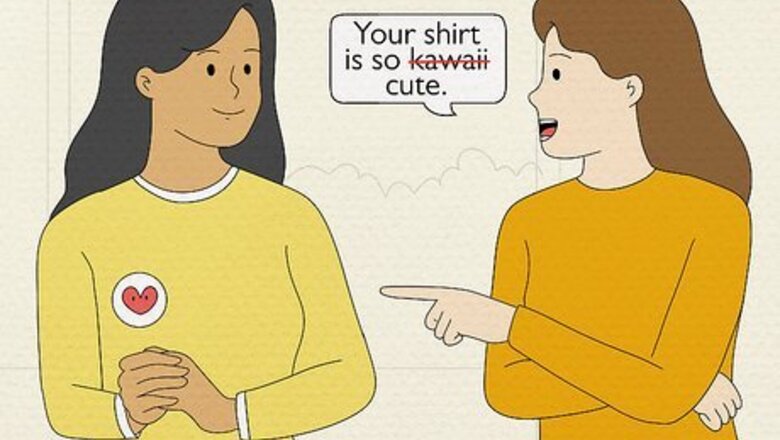
views
- Refrain from falling into common weeaboo stereotypes, like adding Japanese words to your regular conversations.
- Focus on your non-Japanese hobbies and side interests rather than doing activities solely related to manga and anime.
- Learn the Japanese language and study Japanese history to engage with the culture in a healthy way.
How to Avoid Common “Weeaboo” Stereotypes
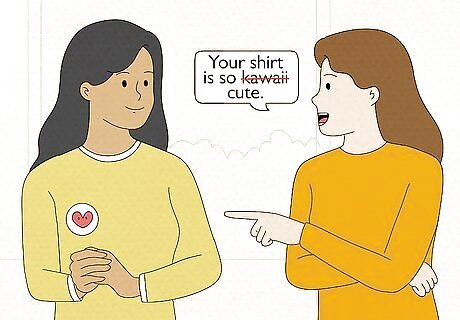
Refrain from sprinkling Japanese words into day-to-day conversations. It’s always great fun to learn new words and phrases from a different language and culture—but hybridizing these words into your regular conversations isn’t the way to go. At best, it’s incredibly cringe-worthy; at worst, it comes across as disrespectful to turn foreign words into glorified slang. For example, if you think your friend’s shirt is cute, tell them that straight up—don’t try to sprinkle in complimentary Japanese words like “kawaii” (cute).
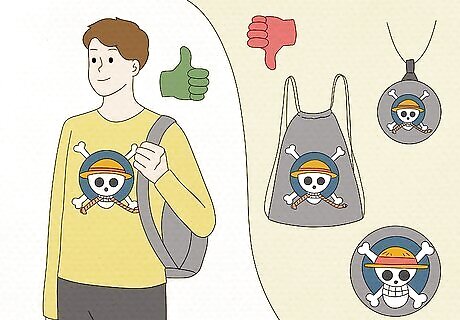
Limit how much anime merch you wear out and about. There’s absolutely nothing wrong with wearing T-shirts, hoodies, and any other kind of merch for your favorite anime and manga series. You might, however, start to give off the wrong impression if these types of garments are the only articles of clothing that you wear. Try to keep your wardrobe options fresh and new so people don’t get the wrong idea.

Embrace your non-Japanese interests and passions. Are you a huge fan of oil painting, or do you love volunteering at your local animal shelter? Spend time with all the different hobbies and interests that bring you joy and fulfillment, rather than engaging with interests exclusively related to anime and manga. If you’re deep in the trenches of a new show, series, or franchise, look for fresh and exciting ways to interact with the content, like drawing fan art or writing fan fiction.

Enjoy a wide variety of media from a wide variety of cultures. Streaming platforms like Netflix and Hulu make it easier than ever to explore media featuring actors, directors, and producers from across the world. Check out some international TV shows like: El Marginal (from Argentina) Strong Girl Bong-soon (from South Korea) Sacred Games (from India) Please Like Me (from Australia)
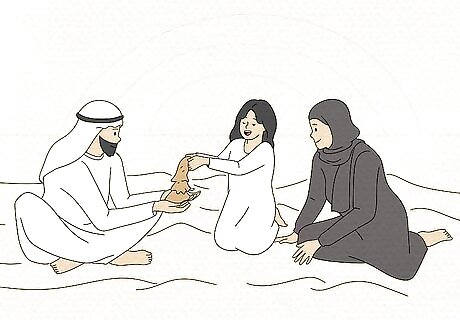
Stay grounded in your own cultural identity. A trademark stereotype of weeaboos is their desire to be Japanese, which is a big step above simply enjoying Japanese media and franchises. The key to avoiding this unfortunate misstep is to embrace who you are, as well as your cultural identity. At the end of the day, there’s no need (or reason) to transplant yourself into another country’s culture. A nation’s culture and traditions belong to the people who have grown up there and been raised with them. Even if a person’s intentions are good, it’s ultimately disrespectful for them to try and “adopt” this sense of tradition and identity for themselves when they don’t actually belong to the culture in question.
How to Appreciate Japanese Culture without Being a Weeaboo
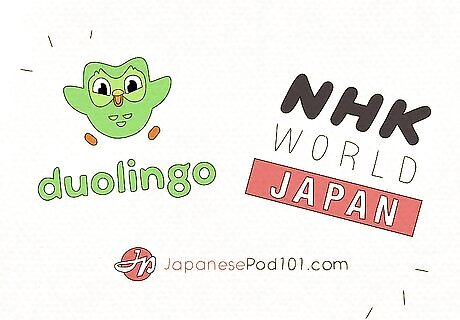
Try learning the Japanese language rather than a few vocab words. Diving into a country’s language is one of the best ways to get an inside look at their culture, mannerisms, and perspective on life. If manga and anime have sparked a genuine interest in Japanese culture within you, take your passion a step further with free resources like: Duolingo NHK World-Japan JapanesePod101 Tae Kim’s Guide to Japanese
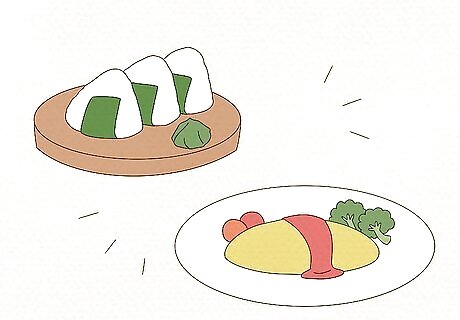
Try making Japanese food at home. What better way to learn more about Japanese culture and cuisine than with firsthand experience? Stock up on ingredients that are pretty common in Japanese recipes, like soy sauce, miso, rice vinegar, mirin (rice wine), and dashi (soup stock base). As you begin your cooking journey, start with easy recipes like: Omurice Sukiyaki Onigiri Udon

Study Japanese history. Like every other country, Japan has a rich and complex history that informs a lot of its current culture. YouTube has plenty of great resources if you’re looking to get your feet wet, like Bill Wurtz’s viral “History of Japan” video. If you’d like to take an even deeper dive into Japanese history and culture, check out books like: A Modern History of Japan: From Tokugawa Times to the Present by Andrew Gordon A Concise History of Japan by Brett Walker The Book of Yokai: Mysterious Creatures of Japanese Folklore by Michael Dylan Foster and Shinonome Kijin History of Art in Japan by Nobuo Tsuji and Nicole Coolidge Rousmaniere
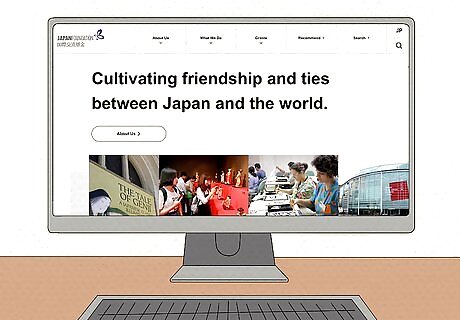
Learn about Japanese culture. Free resources like JapanesePod101 offer plenty of detailed and insightful “classes” about different elements of Japanese culture, from common superstitions and blood type beliefs to info about cherry blossom viewing and the star festival. Some other great educational resources include: Japan Foundation PBS National Geographic
Origins of “Weeaboo” & Similar Terms

The word "weeaboo" stems from a 2000s comic strip. In the 2000s, comic artist Nicholas Gurewitch used the nonsense word “weeaboo” in one of his “Perry Bible Fellowship” comics. This term was reclaimed by moderators of a popular forum site known as 4chan, where it was used to censor/replace slurs used against people who were completely obsessed and infatuated with everything related to Japanese culture. The term has grown in popularity, with the former nonsense word becoming a label for these types of obsessive fans.
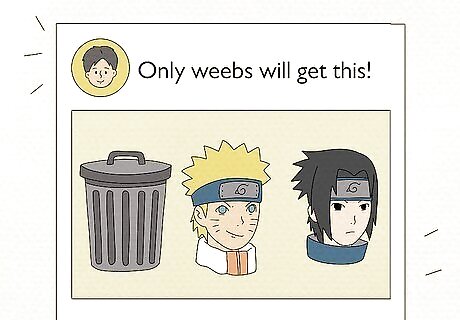
"Weeaboo" and "weeb" have become more humorous terms in recent years. While the term weeaboo (and weeb, by extension) officially carries the same negative definition, not everyone uses it in a negative way. Many people use the term when cracking a joke or engaging in meme culture. For example, an anime fan might post a funny picture on social media with the caption “Only weebs will get this.”

"Otaku" refers to people with a specific interest in anime. It’s important to note, however, that the term “otaku” implies that person in question has a healthy balance between their passion for anime and their everyday life, while weeaboos lack that distinction. Think of it like calling someone a nerd versus calling someone a stan (slang for stalker + fan). Neither term is objectively complimentary, but “stan” has a much more negative connotation than “nerd.” In Japan, the word otaku is used more as a noun for someone who’s a nerd or enthusiast about something. For instance, there are game otaku (fans of video games), idol otaku (fans of idol singers and groups), manga otaku, anime otaku, and so on.
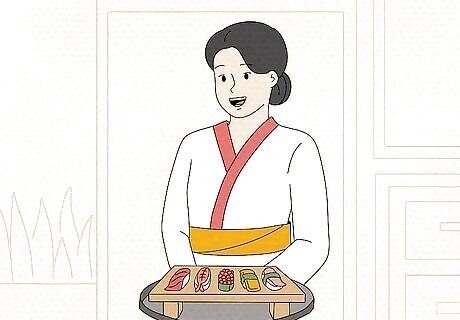
A "Japanophile" is interested in Japanese culture and tradition. Different from a weeaboo, a Japanophile is not interested only in pop culture. The term Japanophile has a more respectful connotation attached to it.
Final Takeaway

It doesn’t matter what other people choose to label you. Unfortunately, there’s no precise “checklist” that can save you from being labeled a certain way. What matters most is that you’re pursuing interests and passions that you really enjoy and that you’re engaging with them respectfully and in moderation. If someone’s poking fun at you with inconsiderate nicknames and labels, poke a little fun back by mentioning how outdated the words “weeb” and “weeaboo” really are. You might say something like: “You’re calling me a weeaboo? Really? 2012 called—they want their slang back.”















Comments
0 comment